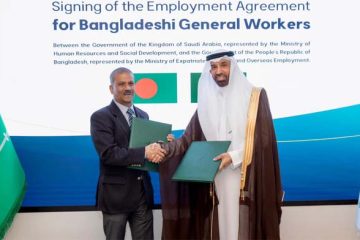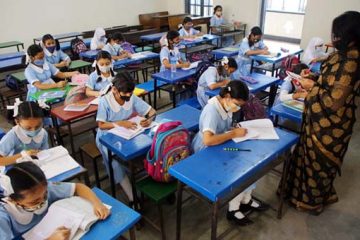Bangladesh has signed a contract with the Russian government, to use funds from the USD 500 million credit from Moscow, for the engineering survey, environment impact assessment, and environment impact management, for the planned Rooppur nuclear power plant, in accordance with the guidelines of International Atomic Energy Association (IAEA). Chairman of Bangladesh Atomic Energy Commission (BAEC), Abu Sayeed Mohammad Feroz, and Valeriy Limarenko, the head of NIAEP-ASE, the Russian state-controlled nuclear power plant design and construction company, signed the contract.
Earlier, Prime Minister Sheikh Hasina had signed a landmark nuclear cooperation deal with Russia, on January 15 this year, for setting up of two 1,000-megawatt nuclear power generation units, to tide over the energy crisis in the country. The site for the plant will be Rooppur in the country’s northwestern Pabna district.
In accordance with the pact, Bangladesh would be obligated to conduct a feasibility study, to develop human resources to run the power plant, complete pre-construction work, and engineering design.
As per agreement, Russia is committed to provide financial support to Bangladesh, to implement the much-talked project, the first of its kind in Bangladesh. Russia has already signed a USD 500 million agreement with Bangladesh in January, to conduct the pre-feasibility survey.
“We have signed the contract with the Russian government, to fulfil the four obligations set by the IAEA that we need to comply with, in order to implement any nuclear power project, in accordance with the guidelines of the international body. We’ll complete the feasibility study within the next 18 months,” project director of Rooppur nuclear power project, Dr Shawkat Akbar, told The Independent.
He also said Moscow will provide training, for human resource development, throughout different stages of the project. “Dhaka University and Bangladesh University of Engineering and Technology have already signed separate MoUs with Russian universities, to include nuclear engineering in their higher studies programmes,” the BAEC official added.
The official said Atomstroyexport (ASE), or any other company, would be the contractor, while the BAEC would be the customer, as per agreement.
A feasibility evolution to determine a techno-economic solution for the Rooppur project, EIA and EIM programme development survey, site engineering survey and environment devices design basis, and development of document for site license, in light of IAEA recommendations, would be the main jobs under this credit, along with the development of human resources.
Although the final cost for this project is not clear, as it depends on the reactor’s design and the technology, but estimates have pegged the cost at between USD 3 billion and USD 5 billion.
The pact comes nearly two years after Dhaka had signed a framework agreement with Moscow, for the nuclear plant in Rooppur, to be completed by 2017-18, at a cost of USD 1.5-2 billion.
“During our visit to Russia, the deputy director-general of ROSATOM told us that we can get about 90 per cent of the required investment for the nuclear power plant, as state credit from Russia,” said the BAEC official.
-With The Independent input




















